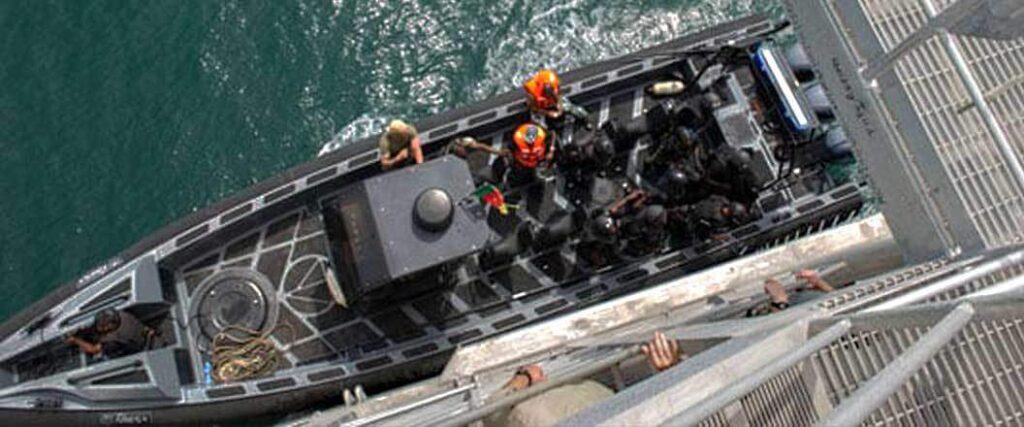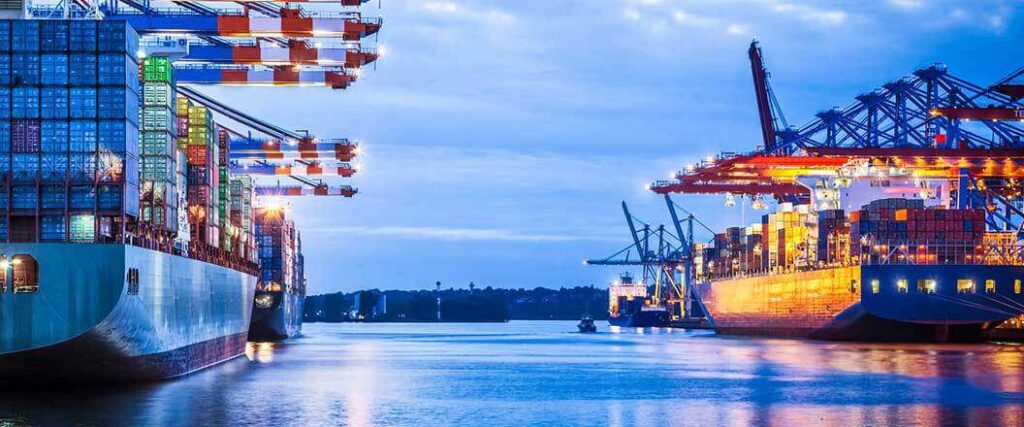Including piracy in marine insurance coverage is a good form of protection to use when shipping products by vessel. Even in modern times, piracy is still a very real problem that importers and exporters face. If the freight you’re shipping is traveling through waters where piracy is common, the best thing you can do is obtain protection for them.
According to the International Maritime Bureau (IMB) Piracy Reporting Center, there were 132 incidents of piracy in 2021. Fortunately, piracy protection insurance is available. This provides financial reimbursement for loss or damage caused by piracy. Many waters around the world are rampant with piracy, so protection is a must.
We’ll explain how piracy in marine insurance can help you, as well as where piracy typically occurs and what vessels modern-day pirates usually target.
We’ve established that maritime piracy is a great threat to importers and exporters that are trying to send their goods around the world. However, the definition of maritime piracy is a bit complicated.
According to the United Nations Convention on the Law of the Sea (UNCLOS) Article 101, piracy is defined as violent detention or depredation by the crew of one private ship toward another one.
Due to the broad definition of piracy given by the UN, there are two specific acts that meet the criteria listed in this definition. According to the United Nations Office on Drugs and Crime (UNODC), these two specific types of piracy attacks are:
For the purposes of this article, we’ll discuss pirate attacks that deal with the robbery of goods or the hijacking of vessels. These types of pirate attacks are the ones that affect importers and exporters the most because their goods are stolen in these incidents.
Checkout our article on inland marine cargo insurance to learn about protection for ground shipments.

Yes, acts of piracy can be covered by marine insurance. Marine cargo insurance will protect the freight of a shipper from loss or damage. However, there are two different types of freight insurance and the coverage they give can vary.
These types of insurance are:
If you choose to use all risk insurance, you’ll need to make sure that piracy isn’t explicitly listed as something not covered in the plan. Most forms of all risk insurance provided by maritime insurance providers do cover pirate attacks. However, policies can change from provider to provider.
Should you choose to use named perils insurance, you’re going to need to make sure that the risks covered in the policy include piracy. Named perils insurance is a more limited insurance plan which means making sure that the policy covers you against piracy is necessary.
There are many providers in the marine insurance market, so make sure that the provider you go with offers a policy that works for you.

our insurance policy should cover you against the risk of piracy because it’s an illegal act that plagues the shipping industry every year. As we stated earlier, there were 132 acts of piracy in 2021 alone. While this number might seem small in comparison to the large amount of freight that was transported in that year, there’s always the risk your goods could be the unlucky few that are seized.
Some of the reasons you should get coverage from piracy on your freight insurance are:
Let’s go into more detail about some of the reasons you’ll want insurance against piracy when you ship internationally.
Theft or damage caused by pirates can cost you a good sum of money as a shipper. The great thing about having insurance on your goods is that you can be financially reimbursed for them. Therefore, you won’t have suffered a total loss if your goods are claimed in an act of piracy.
When a pirate attack on a vessel is successful, the likelihood of recovering the goods they’ve stolen are slim to none.
Modern-day pirates are likely to use the goods that they’ve confiscated in any of the following ways:
Piracy often takes place off the coast of countries struggling economically. Many pirates from these economically unstable countries seek to acquire goods for their own use or to sell for monetary gain. Other pirates, however, are part of terrorist organizations or militant groups and seek to fund their group's goals by selling the goods they’ve acquired.
Regardless of the reason why pirates steal and what they do with stolen goods, you can count on never seeing the goods again if they’re seized. Getting reimbursed for the loss will prevent you from being in an uncomfortable situation.
Another reason you should have insurance against acts of piracy is due to the prevalence of piracy on the ocean seas. Statistics show that the number of piracy incidents in the past few years has actually remained consistent.
| Year | Number Of Piracy Incidents |
| 2016 | 191 |
| 2017 | 180 |
| 2018 | 201 |
| 2019 | 162 |
| 2020 | 195 |
| 2021 | 132 |
Provided by Statista
The number of pirate incidents in the past six years has been very spotty with no consistent downturns. While 2021 had a lower amount of piracy incidents than in the years prior, 132 still remains a large number. Piracy is still common enough that it’s worth getting protection on your goods from incidents like these.
Check out our article on international cargo insurance if you plan on sending goods overseas.

We’ve established that piracy is a common enough occurrence that the benefits of having insurance for it are great. That said, piracy is more common in certain bodies of water than it is in others. Therefore, you might find that insurance for piracy attacks might not be necessary depending on what parts of the world your freight will be shipped to or from.
Some bodies of water and areas of the world that have frequent pirate activity are:
We won’t cover every area where piracy occurs, but we’ll discuss the areas where it’s the worst. If you're worried about your freight being stolen when it's traveling on land, then read our article on cargo theft prevention.
The Malacca Strait is one of the most active areas for piracy in the world. This body of water is in between the peninsula nation of Malaysia and Sumatra, an island belonging to Indonesia.
There are a few reasons why the strait of Malacca is such a hot spot for maritime piracy:
Privacy has been an issue in the region for quite some time which makes it a hazardous area for freight to be shipped through. Authorities in Indonesia, Singapore, and Malaysia have been working together to reduce piracy through this waterway, but activities still persist. If your freight is coming from or going through this waterway, it’s best to have it insured.
Not too far from the Malacca Strait is another body of water that’s home to a high amount of piracy as well. This is the South China Sea and like the Malacca Strait, extremely high volumes of freight are transported through it every year. According to some estimates, around $5.3 trillion worth of goods are transported through it annually.
Much of the piracy that occurs in the South China Sea takes place closer to the Malaysian coast. The country of Malaysia has recognized its piracy problem and has taken steps to stop it. As recently as December 2021 of last year, the country passed a bill to imprison those found guilty of piracy for as long as 20 years.
That said, you should still consider insuring against piracy if your freight will pass through this area.
The Gulf of Aden can be found between the southern coast of Yemen and the northern part of Somalia. The Gulf of Aden leads into the Red Sea which then leads into the Suez Canal. Since the Suez Canal makes shipping from Europe and Asia easier, the Gulf of Aden is notorious for pirates intercepting vessels coming from Asia.
To demonstrate how important the Gulf of Aden is to international trade, consider some of the following information below:
Due to its importance, just avoiding it as a shipping lane is not a solution. While piracy in the Gulf of Aden has slowed down in recent years, the area still has pirate-related incidents. Therefore, you should plan with care if the goods you ship will pass through this body of water.
More recently, there’s been a surge of piracy in the Gulf of Guinea and it now has the highest amount of piracy in the world. The Gulf of Guinea can be found in the western part of Africa.
Depending on the source, it extends to the borders of the following countries:
To show just how dangerous this area is for seaborne freight and the crew members transporting it, consider some of the recent trade data.
In 2020 alone the Gulf of Guinea was home to:
The reason piracy has become so rampant here is due to the disorder surrounding the oil industry in western Africa. Because of this, the black market in Africa is becoming increasingly large and attracting all the wrong kinds of people. Additionally, many of these countries are impoverished and people turn to piracy as an opportunity to make easy money.
Due to the rise of piracy in this region, it’s strongly suggested that you obtain piracy insurance for your goods if they’re traveling through the Gulf of Guinea.

Due to the various features and qualities that cargo can come in, certain types of vessels have to be used to transport specific kinds of freight. Knowing which types of ships pirates target will help you discern whether or not you should get cargo insurance.
With that said, most modern-day pirates attack the following two types of vessels:
Cargo container ships are the primary vessel type used to transport manufactured goods. A container ship could provide terrorists access to a wide array of goods once opened. As we established in our section about the Gulf of Guinea, many pirates also opt to target oil tankers.
Oil is a valuable resource, one that pirates can sell to make a large profit. If you’re shipping oil or freight that’s traveling in a cargo container, then getting insurance to protect you from piracy is a good idea.
At Freight Insurance Coverage, all shipments that you book with us will have insurance added to them automatically. The cost of the insurance we provide will also be factored into the total cost reflected in your quote.
By adding cargo insurance automatically, you won’t have to worry about remembering to add it on your own later.
Our insurance specialists can review various options with you.
If you’re ready to ship freight and want top-of-the-line insurance protecting it, fill out a risk-free quote form online now or call our team at (866) 975-0749 for any questions you might have.
Freight Insurance Coverage
315 NE 14th Street #4122
Ocala, FL 34470